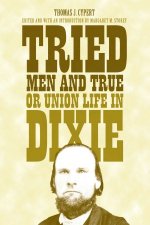jazzeum
Four Star General
- Joined
- Apr 23, 2005
- Messages
- 38,901
Came across this at Civil War Books and Authors, www.cwba.blogspot.com

The books sounds quite interesting and here is their review:
****
The study of southern unionism forms one of the most popular arenas for academic Civil War and Reconstruction scholarship, and Margaret Storey's editing of Captain Thomas J. Cypert's never before published 1866 memoir Tried Men and True, or Union Life in Dixie is an important contribution. Before the war, Cypert settled in Wayne County, Tennessee, a Whig stronghold located along the state's border with Alabama. Slaves made up 14% of the county's population (far less than the state average), and Cypert, whose antebellum party affiliation is not known for certain (but was likely American Party post breakup of the Whigs), did not own any and opposed secession along with the majority of county voters.
Tried Men and True is both a civilian and military memoir. Cypert begins his writing with the secession of Tennessee, bitterly describing the mistreatment of unconditional unionists by Confederates. In 1863, Cypert joined the 2nd Tennessee Mounted Infantry, a unit that conducted scouting operations and anti-guerrilla sweeps in the region. It was often brutal fighting, with atrocities against soldiers and civilians committed by both sides. Cypert was captured by Confederate authorities at home in 1864, but later escaped and returned to his command for a time before being discharged. Writing his memoir immediately after the war, with the purpose of promoting loyalist political power and denouncing former Confederates, state Senator Cypert had no interest in detailing his own command's misdeeds.
Editing the Cypert manuscript could be in no better hands than those of historian Margaret Storey, the author of the pathbreaking Loyalty and Loss: Alabama's Unionists in the Civil War and Reconstruction (LSU Press, 2004). In her explanatory notes, she addresses Cypert's omissions and mistakes and offers helpful context pertaining to persons, places, and events. She even went so far as to compile an extensive biographical register of notable persons mentioned in the memoir. Additionally, she provides a terrific introduction that both outlines Cypert's prewar life (sketchy as the details are) and presents a useful socio-political profile of Wayne County. Like other scholars of Tennessee unionism have discovered, kinship ties and antebellum Whig political affiliation traditions, rather than particular views on slavery, strongly correlated with anti-Confederate ideology and willingness to enlist in southern unionist military units like the 2nd Tennessee Mounted Infantry.
Although naturally one sided and agenda driven, Cypert's memoir offers Civil War students a vivid portrait of what life was like for vocal unconditional unionists residing on the cusp of the Deep South. Its value is only enhanced by the atypical geography and rare first person narrative of unionist counterinsurgency operations along the Tennessee-Alabama border. Highlighting the post war struggles of these men to justify their wartime positions and maintain political power in the difficult years of Reconstruction, Tried Men and True significantly enriches the scholarly literature of southern unionism.
***
Available from Amazon, http://www.amazon.com/Tried-True-Un...UTF8&coliid=I40ZOE2NMWHEZ&colid=2E04QKK95V25C

The books sounds quite interesting and here is their review:
****
The study of southern unionism forms one of the most popular arenas for academic Civil War and Reconstruction scholarship, and Margaret Storey's editing of Captain Thomas J. Cypert's never before published 1866 memoir Tried Men and True, or Union Life in Dixie is an important contribution. Before the war, Cypert settled in Wayne County, Tennessee, a Whig stronghold located along the state's border with Alabama. Slaves made up 14% of the county's population (far less than the state average), and Cypert, whose antebellum party affiliation is not known for certain (but was likely American Party post breakup of the Whigs), did not own any and opposed secession along with the majority of county voters.
Tried Men and True is both a civilian and military memoir. Cypert begins his writing with the secession of Tennessee, bitterly describing the mistreatment of unconditional unionists by Confederates. In 1863, Cypert joined the 2nd Tennessee Mounted Infantry, a unit that conducted scouting operations and anti-guerrilla sweeps in the region. It was often brutal fighting, with atrocities against soldiers and civilians committed by both sides. Cypert was captured by Confederate authorities at home in 1864, but later escaped and returned to his command for a time before being discharged. Writing his memoir immediately after the war, with the purpose of promoting loyalist political power and denouncing former Confederates, state Senator Cypert had no interest in detailing his own command's misdeeds.
Editing the Cypert manuscript could be in no better hands than those of historian Margaret Storey, the author of the pathbreaking Loyalty and Loss: Alabama's Unionists in the Civil War and Reconstruction (LSU Press, 2004). In her explanatory notes, she addresses Cypert's omissions and mistakes and offers helpful context pertaining to persons, places, and events. She even went so far as to compile an extensive biographical register of notable persons mentioned in the memoir. Additionally, she provides a terrific introduction that both outlines Cypert's prewar life (sketchy as the details are) and presents a useful socio-political profile of Wayne County. Like other scholars of Tennessee unionism have discovered, kinship ties and antebellum Whig political affiliation traditions, rather than particular views on slavery, strongly correlated with anti-Confederate ideology and willingness to enlist in southern unionist military units like the 2nd Tennessee Mounted Infantry.
Although naturally one sided and agenda driven, Cypert's memoir offers Civil War students a vivid portrait of what life was like for vocal unconditional unionists residing on the cusp of the Deep South. Its value is only enhanced by the atypical geography and rare first person narrative of unionist counterinsurgency operations along the Tennessee-Alabama border. Highlighting the post war struggles of these men to justify their wartime positions and maintain political power in the difficult years of Reconstruction, Tried Men and True significantly enriches the scholarly literature of southern unionism.
***
Available from Amazon, http://www.amazon.com/Tried-True-Un...UTF8&coliid=I40ZOE2NMWHEZ&colid=2E04QKK95V25C

